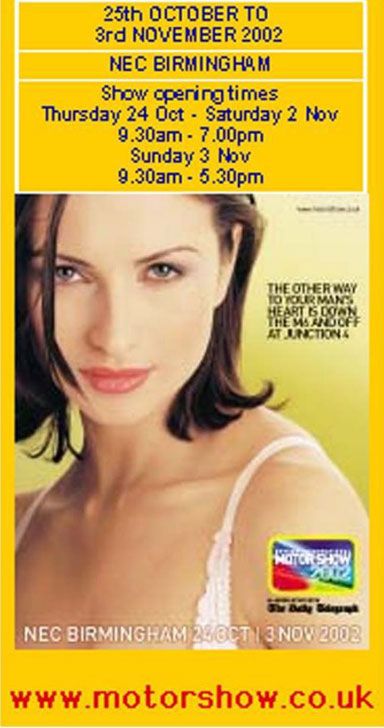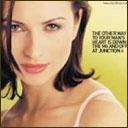UK Minister Attacks "Sexist" Car Industry
 ""The other way to a man's heart is down the M6 and off at Junction 4" |
 |
LONDON, Oct 28, 2002; Reuters reported that Trade and Industry Secretary Patricia Hewitt hit out on Monday at Britain's motor industry, calling it sexist and "pathetic".
Hewitt, who is also Minister for Women, was enraged by an advertisement for the British International Motor Show that featured a woman wearing a lacy bra.
"I find this poster pathetic," she was quoted in the Independent newspaper as saying. "We all know that sex sells, but haven't we got past 'boys with toys'?"
The poster, displayed on billboards and in newspapers, urges women to find a new way to their man's heart -- by driving them to the show in Birmingham, central England.
"...this looks like something out of the 1950s, rather than an advert for a modern motor show," Hewitt said.
"It is a real pity they have chosen to reinforce old cliches, rather than present a modern image."
Women drivers are expected to outnumber their male counterparts in the next 10 to 15 years, prompting many car firms to switch their appeal to female drivers.
But Hewitt, who is due to give a speech at the motor show on Monday, said the adverts would likely scupper car manufacturers' efforts to dispel their sexist image.
"Women are increasingly taking the driving seat... personally I believe these adverts are a big mistake," she said.
Full Article Courtesy The Independent
Motor industry is sexist and 'pathetic', says minister
By Marie Woolf, Chief Political Correspondent
28 October 2002
Patricia Hewitt, the Secretary of State for Trade and Industry, has criticised Britain's leading motor show for promoting itself with "pathetic" chauvinist advertisements.
Ms Hewitt, due to speak at the British International Motor Show at Birmingham's NEC today, was horrified when shown a poster featuring a young woman wearing a lacy bra. It urged women to find a way to "your man's heart" by driving to the show, which features "lots of boys' toys".
Ms Hewitt, who is also Minister for Women, criticised the show for pandering to out-of-date sexist notions and described the advertisement as "old-fashioned rubbish".
"As Minister for Women, I find this poster pathetic. We all know that sex sells, but haven't we got past 'boys with toys'?" she said. "In terms of consumer power, women are increasingly taking the driving seat, but this looks like something out of the 1950s, rather than an advert for a modern motor show. It is a real pity they have chosen to reinforce old clichés, rather than present a modern image."
Her words are all the more damning because, as well as being the cabinet minister responsible for the motor industry, she supports its attempts to encourage the 50,000 female science, engineering and technology graduates currently not in work to take up the 17,000 engineering-related vacancies in the UK.
Ms Hewitt, a former management consultant, believes the ads will set back car manufacturers' efforts to shrug off their sexist image.
"We support the motor show and we support the automotive sector," Ms Hewitt said. "But personally I think these adverts are a big mistake. Manufacturers are constantly telling me about the lack of skilled young people coming into the profession, but posters like this hardly help the recruitment drive."
Most car manufacturers are making fresh attempts to appeal to women drivers, who are poised to outnumber male motorists in the next 10-15 years. Vauxhall believes that almost half of car purchases are now made by women.
Chris Powell, the chairman of the advertising agency BMP DDB, said: "The ads suggest manufacturers think car drivers are idiots. These ads are completely out of date."
 Motorshow Ad in Question |
Show Organizers Respond
Full Article Courtesy Manchester Guardian
The organisers of the Motor Show have defended poster ads featuring a woman in a lacy bra after a government minister slammed them as "sexist" and "pathetic".
The trade and industry secretary, Patricia Hewitt, launched a scathing attack on the ad, accusing the car industry of being stuck in the 1950s and saying it "needs to change".
But Al Clarke, the head of communications for the Motor Show, said the controversial posters had been designed by a woman, and insisted many visitors to the event had found them funny.
And he claimed the ad, which carries the caption "The other way to a man's heart is down the M6 and off at Junction 4", was simply a "witty" attempt to encourage women to take their partners to the Motor Show.
"The advert itself is quite witty and quite funny," he said. "The irony is that it was designed by a woman and it's aimed at women."
The advertisement reflected both the "forward-looking" and progressive attitude in the British motor industry and the theme of the show - emotional engagement with cars - Mr Clarke said.
The advertising standards authority launched an investigation into the campaign after it appeared in magazines earlier this year.
But the watchdog ruled that although it was "tasteless", the image was unlikely to cause serious or widespread offence.
Mr Clarke said the ASA's ruling vindicated the decision to reuse the image.
But a spokeswoman for the ASA said it would launch a new investigation if more people complained about the ads now they had appeared on poster sites.
Ms Hewitt, who was today helping to promote the Motor Show's careers day, rejected claims that the advert was "just a bit of fun".
She said it was more important to get more young people into engineering and manufacturing and "helping to reverse what has been a very long decline in manufacturing".
It is rare for a minister to criticise an organisation for its adverts, although campaigns often come in for criticism from political and religious groups.
Government aides yesterday denied Ms Hewitt was trying to take the moral high ground, but said she had genuine objections to the style of the advertising campaign.


